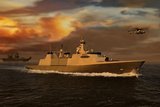West African states working on multinational security structure
West African states are working together to implement an agreement that will produce a multinational structure to combat elements such as piracy, drug trafficking, illegal fishing and human trafficking in the Gulf of Guinea.
The initiative will divide the Gulf into three zones and facilitate trans-national operations to deal more effectively with the growing problem of maritime crime in the region. Illegal bunkering alone, using stolen fuel, is estimated to be worth more than $70 million a year to criminals.
Governments across the region, including some that are land locked but rely significantly on coastal states for commercial links,
Already have an account? Log in
Want to keep reading this article?
More from Naval Warfare
-
![Spain’s F100 upgrade mirrors Aegis modernisation paths in allied navies]()
Spain’s F100 upgrade mirrors Aegis modernisation paths in allied navies
The Spanish Navy’s Alvaro de Bazan-class of air defence frigates will receive the latest Aegis Weapon System technology among other modernisations to extend the service life to 2045.
-
![UK’s Fleet Solid Support ship programme deemed on track despite steel supply concerns]()
UK’s Fleet Solid Support ship programme deemed on track despite steel supply concerns
Shipbuilders are saying the programme is going ahead on time as the government estimates 7.7 million tonnes of steel are needed for 2026 infrastructure projects.
-
![As Indonesia doubles up its order, who else is looking at the Arrowhead 140 frigate design?]()
As Indonesia doubles up its order, who else is looking at the Arrowhead 140 frigate design?
The adaptable design of Babcock’s Arrowhead 140 frigate, already selected by the UK Royal Navy and Poland, has led to more orders from Indonesia while other countries continue to weigh it up.






















